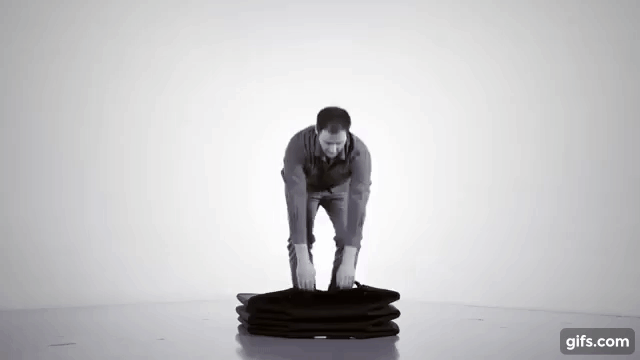Dear Mr. Brody
The old adage reminds us “if something seems too good to be true, it probably is.” Oleomargarine heir Michael James Brody, Jr., the subject of Keith Maitland’s intriguing documentary, “Dear Mr. Brody,” seems poised to disprove that adage. When the film opens, Brody promises to give away his entire fortune, doling it out to anyone who writes him a letter asking for cash. He’s 21 years old in 1970, and rich enough to buy all the seats on a 747 just so he can dramatically make his announcement. His rationale for invoking the main plot element of “Brewster’s Millions” was to usher in an era of world peace. At the time, world peace sounded as groovy to hippie philosophers like Brody as free money sounded to everyone else. But no amount of charity can bring about a world where everyone loves one another—human beings are too corrupt for that. And no matter how good the intention, it still has the potential to pave the road to Hell. To prove he was on the level, Brody gave out his office phone number and Manhattan address at 1650 Broadway, as well as his home address in Scarsdale, NY. Of course, people showed up in droves at both locations, creating a logistical nightmare. Brody threw $100 bills at some of his early appearances, and Maitland provides plenty of footage of reporters asking people how much money they’ll be hitting their new benefactor up for if they get to see him. Surprisingly, no one is asked if they had heard that other adage about how you can’t get something for nothing. Perhaps it’s because the media took this venture so seriously. Brody was on the front page of newspapers worldwide. Ed Sullivan put the wannabe singer-songwriter and his wife, Renee on his “really big shew.” On the same network, respected newsman Walter Cronkite reported on him after the two allegedly smoked grass. Cronkite looks real happy in that clip. Brody’s experiment lasted 10 days. Before it went down in flames, he was constantly shadowed by a press corps that included the late "60 Minutes" correspondent Ed Bradley, and hounded by mobs of people seeking a snippet of his fortune. He appeared on TV looking sleep deprived and irritated, begging to be temporarily left alone and constantly changing his net worth from the original $25 million figure. As if the truth weren’t strange enough, Brody also attempted to bribe President Nixon to end the Vietnam War, going so far as to try and fly a helicopter into White House airspace despite warnings it would be blown out of the sky. “He kept telling the pilot to keep going while throwing money at him,” said Renee. And then there are the letters that give “Dear Mr. Brody” its title. There are thousands of them, many in several boxes holed up in Hollywood producer Ed Pressman’s storage area, left there after a botched attempt to make a fictional movie of Brody’s life with Richard Dreyfuss in the lead. Others reside with Brody’s son, Michael Brody III. They are all unopened, and therefore unanswered. Considering the worldwide exposure, letters poured in from everywhere. Even if Brody’s intentions were completely noble, there’s no way he would have gotten through them all. His small group of helpers included a few friends, Renee and Bunny Jones, an entrepreneur with several hair salons. Jones sought money for her ventures and walked out of Brody’s house, to quote the reporter interviewing her, “as a beneficiary of his largesse.” They became partners in Astral Recording Studios. Though we follow the tragic trajectory of Brody’s short life, much of the focus of “Dear Mr. Brody” is on those who dared pursue a payout. “To look at that group of people,” Bunny’s son, Chris says about the lines outside Brody’s office, “and to see the excitement in their faces … I went ‘oh my God, this is so out of control.’” In several scenes, we see those people, their smiles wider than the Kool-Aid Man’s as they tell their tales of woe, redemption and greed. One man suddenly realizes that his problems are miniscule compared to others and decides to walk away empty-handed. For the letter writers, Maitland stages re-enactments that look period-specific both visually and in their casting. His producer, Melissa Robyn Glassman appears onscreen to read some entries as well. As with the director’s prior film, “Tower,” animation is frequently employed. At first, I found these elements to be a bit too cheesy for my taste. Eventually, I succumbed to the well-presented idea that every letter told a story, presenting a snapshot of the life of the writer at that moment. Some of the letters are darkly humorous: One guy wants money so he escape his in-laws, while another needs $2,000 ($14,492 in today’s money) to pay off his pusher. However, for the most part, the epistolary endeavors chosen were crafted by working-class people with the same, familiar needs we know today. People asking for money to keep the lights on, to feed their kids, to pay bills medical and otherwise. To keep them afloat because they’re out of work or ve


The old adage reminds us “if something seems too good to be true, it probably is.” Oleomargarine heir Michael James Brody, Jr., the subject of Keith Maitland’s intriguing documentary, “Dear Mr. Brody,” seems poised to disprove that adage. When the film opens, Brody promises to give away his entire fortune, doling it out to anyone who writes him a letter asking for cash. He’s 21 years old in 1970, and rich enough to buy all the seats on a 747 just so he can dramatically make his announcement. His rationale for invoking the main plot element of “Brewster’s Millions” was to usher in an era of world peace. At the time, world peace sounded as groovy to hippie philosophers like Brody as free money sounded to everyone else. But no amount of charity can bring about a world where everyone loves one another—human beings are too corrupt for that. And no matter how good the intention, it still has the potential to pave the road to Hell.
To prove he was on the level, Brody gave out his office phone number and Manhattan address at 1650 Broadway, as well as his home address in Scarsdale, NY. Of course, people showed up in droves at both locations, creating a logistical nightmare. Brody threw $100 bills at some of his early appearances, and Maitland provides plenty of footage of reporters asking people how much money they’ll be hitting their new benefactor up for if they get to see him. Surprisingly, no one is asked if they had heard that other adage about how you can’t get something for nothing. Perhaps it’s because the media took this venture so seriously. Brody was on the front page of newspapers worldwide. Ed Sullivan put the wannabe singer-songwriter and his wife, Renee on his “really big shew.” On the same network, respected newsman Walter Cronkite reported on him after the two allegedly smoked grass. Cronkite looks real happy in that clip.
Brody’s experiment lasted 10 days. Before it went down in flames, he was constantly shadowed by a press corps that included the late "60 Minutes" correspondent Ed Bradley, and hounded by mobs of people seeking a snippet of his fortune. He appeared on TV looking sleep deprived and irritated, begging to be temporarily left alone and constantly changing his net worth from the original $25 million figure. As if the truth weren’t strange enough, Brody also attempted to bribe President Nixon to end the Vietnam War, going so far as to try and fly a helicopter into White House airspace despite warnings it would be blown out of the sky. “He kept telling the pilot to keep going while throwing money at him,” said Renee.
And then there are the letters that give “Dear Mr. Brody” its title. There are thousands of them, many in several boxes holed up in Hollywood producer Ed Pressman’s storage area, left there after a botched attempt to make a fictional movie of Brody’s life with Richard Dreyfuss in the lead. Others reside with Brody’s son, Michael Brody III. They are all unopened, and therefore unanswered. Considering the worldwide exposure, letters poured in from everywhere. Even if Brody’s intentions were completely noble, there’s no way he would have gotten through them all. His small group of helpers included a few friends, Renee and Bunny Jones, an entrepreneur with several hair salons. Jones sought money for her ventures and walked out of Brody’s house, to quote the reporter interviewing her, “as a beneficiary of his largesse.” They became partners in Astral Recording Studios.
Though we follow the tragic trajectory of Brody’s short life, much of the focus of “Dear Mr. Brody” is on those who dared pursue a payout. “To look at that group of people,” Bunny’s son, Chris says about the lines outside Brody’s office, “and to see the excitement in their faces … I went ‘oh my God, this is so out of control.’” In several scenes, we see those people, their smiles wider than the Kool-Aid Man’s as they tell their tales of woe, redemption and greed. One man suddenly realizes that his problems are miniscule compared to others and decides to walk away empty-handed.
For the letter writers, Maitland stages re-enactments that look period-specific both visually and in their casting. His producer, Melissa Robyn Glassman appears onscreen to read some entries as well. As with the director’s prior film, “Tower,” animation is frequently employed. At first, I found these elements to be a bit too cheesy for my taste. Eventually, I succumbed to the well-presented idea that every letter told a story, presenting a snapshot of the life of the writer at that moment. Some of the letters are darkly humorous: One guy wants money so he escape his in-laws, while another needs $2,000 ($14,492 in today’s money) to pay off his pusher.
However, for the most part, the epistolary endeavors chosen were crafted by working-class people with the same, familiar needs we know today. People asking for money to keep the lights on, to feed their kids, to pay bills medical and otherwise. To keep them afloat because they’re out of work or veterans returning home from the war. “Dear Mr. Brody” seeks out a few people who wrote letters or had relatives who did. The results are moving without being manipulative, earning a few lumps in the viewer’s throat. One woman reads a personal letter from her 14-year old self; in another scene, teary-eyed sisters laugh at something their late mother did to her letter that immediately identified her as the author. We’re flies on the wall, getting to know these people briefly as we watch past and present converge.
Maitland and company present information that elicits one response or opinion, then adds extra information that complicates our reactions rather than contradicts them. Was Brody a puppet master of sorts, a lonely, poor little rich boy who enjoyed watching desperate folks jump through hoops? Or did he truly believe giving away his fortune would heal the world? And did his constant use of PCP give him that delusion? Were the thousands of people who wrote or typed out letters to him freeloaders, or were they naïve souls humbling themselves in the hopes they had a guardian angel?
That last question stuck with me. A cynic, or any con artist worth their hustle, would have steered clear of Brody, especially if they thought he was running a scam. Not counting the 54 boxes of unread letters in Michael Brody III’s house, Pressman’s letters total over 32,000, 11,000 of which were read by the filmmakers before donating their entire lot to the Columbia Rare Books library. A small percentage might have been written just for the hell of it, but there’s too much uncertainty for the majority of greedy folks to invest their time. That leaves the hopeful, the desperate and the cautiously optimistic.
Regardless of who attempted to correspond, “Dear Mr. Brody” does a fine job of showing how the financial chasm between rich and poor people is as wide and insurmountable today as it was in 1970. While we don’t get a definitive verdict on Michael Brody, we are left with the revelation that anyone can go to Columbia and open any of the remaining letters. That would be even more fascinating than this entertaining documentary. And it would be interactive.
















